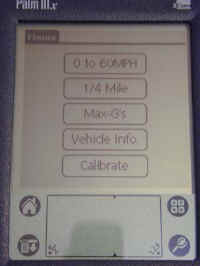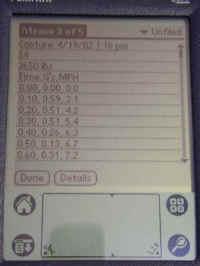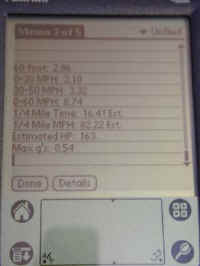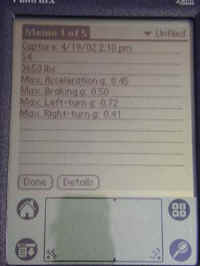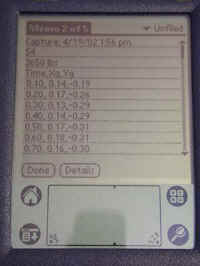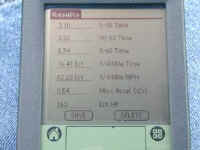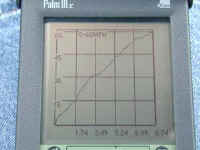| Tech Article Title | Author | Date |
| Review: PocketDyno | Don Pavlik | 2002 |
 |
So how fast is your car anyway? How much horsepower is it putting out? Did your latest high performance engine modification hurt or help your performance? Answering these questions with
any accuracy is rather difficult. Sure sure sure, you could use your butt dyno and say it "feels" faster or made an improvement but over the years I've found that what your butt says and what is really going on often don't agree. Solution? Enter PocketDyno! PocketDyno is a small box (approx. 3" x 5"x 1") that hooks up to PalmOS based PDAs through a serial cable to give you on-the-fly data of how the a vehicle is performing. I used a Palm IIIx for this review. The unit itself runs on a 9v battery so no external power is required. PocketDyno software for Palm or Handspring must loaded via the sync cradle or IR port.Measuring
vehicle performance is a simple matter of doing an initial calibration, entering the vehicle weight, securely mounting PocketDyno in the vehicle, choosing the desired function, tapping "Go" on the menu and putting your foot down on the throttle. As soon as the car starts moving PocketDyno begins measuring. Once it's finished measuring the current run it beeps to let you know it's time to get off the throttle--a seemingly simple, but very handy feature. What separates PocketDyno from other devices such as the G-TECH/Pro or say a Race Technology AP-22 is the amount of information that can be obtained from just a single 0-60 MPH run through the gears. After you've pulled safely off the road a quick glance at your PDA will give provide you with:- 60' time
- 0-30 MPH
- 30-50 MPH
- 0-60 MPH
- An estimated 1/4 mile E.T. and trap speed
- Estimated horsepower
- Maximum Gs the vehicle pulled during the run
- An acceleration graph
- Data log of the run showing time, Gs and MPH
The estimated 1/4 mile information is a nice feature since there are few places you can legally do this kind of testing--it also proved to be quite accurate. I'm not aware of any other consumer affordable device out there that will provide this amount of information in one shot. With most other tools you'd need to perform several runs in different modes to get this level of detail which, of course, would yield slightly different data each time making it hard to directly compare the results. Basic tools like the G-TECH/Pro don't provide anything but a single tidbit of data. PocketDyno is impressive in this respect. Other functions include running a true 1/4 mile and maximum Gs with up to 20 seconds of data logging. Data from runs are saved in the memo pad of the PDA which can later be uploaded to a PC and imported into a spreadsheet such as Excel if you wish to do further data crunching, printouts or produce graphs from the data.
PocketDyno was very easy to use and provided consistent and repeatable results. I did all my testing with PocketDyno, a G-TECH/Pro
and Race Technology AP-22 in the vehicle to compare results. PocketDyno and the AP-22 were within .1 to .2 tenths of each other in all the runs I did while the G-TECH/Pro was off in the weeds often showing results as much as .8-.9 tenths optimistic. The AP-22 had earlier been calibrated against actual 1/4 mile runs at a track to confirm it's accuracy since I use it for normal instrumented testing. I think the AP-22 may be bumped from my toolbox in favor of PocketDyno. Yes, this is a useful tool. The only thing lacking, oddly enough, is the ability to do 60-0 braking distance although I'm told that function will be available in future software releases for PocketDyno. All in all, a nice tool for any performance enthusiast toolbox.Note that the data displayed in the accompanying photos is not representative of the normal performance of vehicle I used for testing. Runs were done with very easy starts and lazy shifts since I was doing many many back to back runs.
PocketDyno, priced at $349, is available from Hamilton Performance Electronics. http://www.pdyno.com
